Ian Austin, Labour MP for Dudleypublished at 08:39 GMT 20 February 2015
tweets, external: Students @WLV_UNI on @BBCr4today say they won't vote after tuition fees hike. But it's because students don't vote that they do these things
UK government finances showed a surplus of £8.8bn in January, the Office for National Statistics said
A Lords report on the Ukraine crisis accused the UK and EU of a "catastrophic misreading" of the Kremlin's mood
The Scottish Conservatives held their conference in Edinburgh
George Osborne and Boris Johnson unveiled plans for 24hr transport services in 'long term plan for London'
There are 76 days until the general election
Dominic Howell and Adam Donald
tweets, external: Students @WLV_UNI on @BBCr4today say they won't vote after tuition fees hike. But it's because students don't vote that they do these things
 Nick Robinson
Nick Robinson
Political editor
I understand that Labour has still not agreed how to finance a cut in tuition fees from £9,000 a year to £6,000 a year even though the policy is due to be announced in a week's time. Peter Mandelson, the former minister responsible for universities, will give a speech later today in which he will warn the universities must be compensated in full for any cut in their income due to a cut in their income from tuition fees. Recently university vice chancellors wrote to The Times to warn about the consequences they could face. This is the argument that has been made by the Shadow Business Secretary Chuka Umunna and Shadow Universities Minister Liam Byrne ever since Ed Miliband signalled in 2011 that he wanted to go into the election promising a cut in tuition fees. However, the party has yet to agree where to find for £1.7 billion a year needed to finance the policy. Sources told the BBC that the process of developing the policy was on-going.
 Nick Triggle
Nick Triggle
Health correspondent
The words privatisation and NHS together are enough to start a fight in an empty room. But what exactly do we mean by it? And why does the issue make many so angry? London's Cromwell Hospital, run by Bupa, does a good trade in NHS patients at its gamma knife radiosurgery centre. About a third of the patients with brain tumours seen there are sent by the NHS, costing the health service nearly £7,300 a go. But even the most ardent critics of privatisation in England (it tends to be a debate which is focused there) accept this. Why? Because the NHS only has a handful of such units as it hasn't been considered economically viable to open more. So when demand requires the NHS pays for them to be seen privately. Read Nick's full article: NHS privatisation: Why the fuss?
 BBC Radio 4 Today
BBC Radio 4 Today
Bed-blocking, in which NHS patients well enough to leave hospital remain there because there's nowhere for them to go to, is putting severe pressure on the NHS. At one hospital in Southampton, from where Zoe Conway has been reporting for the Today programme, management said one in seven beds are taken up by people who don't need to be there. "We need a wake-up call," says David Pearson, president of the Association of Directors of Adult Social Services. He told Today: "Politicians need to be absolutely clear about what they're going to do about this as we go into the general election."
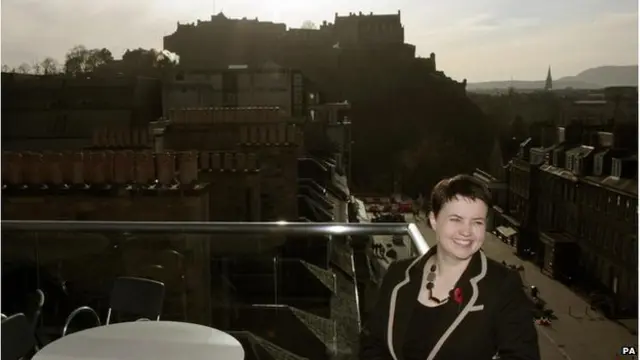 Image source, PA
Image source, PAIn Scotland the focus is on Edinburgh, where the Scottish Conservatives are gathered for their spring conference. Leader Ruth Davidson is to call for a "parent power" shake-up of education and will suggest that school communities should have a new right of opting-out of local authority control. "I can tell you this: in Scotland right now there are parents and communities who would love the chance to run their school, but are being told they can't," Ms Davidson is expected to say. Here's our preview of her speech.
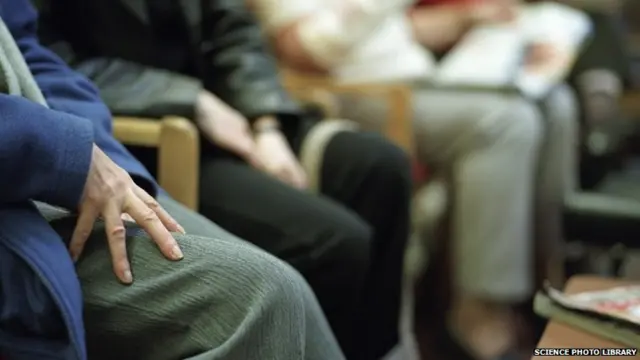 Image source, Science Photo Library
Image source, Science Photo LibraryNHS integration, called for by Chris Ham on Today earlier (see below), should be taken even further by giving patients flexibility in how they spend their money, a think-tank suggests today. Civitas' report, external proposes letting people receiving treatment on the NHS take the money that would have been spent on them to any suitable healthcare provider. "This is one means of challenging the existing 'postcode lottery' where patients have widely differing quality of NHS treatment in different areas of the country," the report's authors write. The debate about the NHS' future continues on the Today programme just before 08:30.
 BBC Radio 4 Today
BBC Radio 4 Today
Vince Cable says it is unfortunate if young people do not vote as the agenda will then be dictated by older people, especially on areas like housing and jobs. He urges young people to get out and have their voice heard and vote in their own self-interest. He says the "lesson we have got to learn" is that you have to spell out the truth and "tell things as they are".
 BBC Radio 4 Today
BBC Radio 4 Today
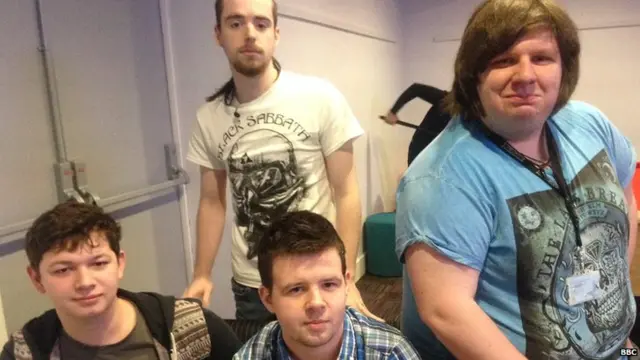
Today reporter Sima Kotecha has been to the constituency of Wolverhampton South West - a marginal Conservative seat with a student population of 20,000. Among those she spoke to were these students from Wolverhampton University who aren't planning to vote in May. They say it would be "a waste of time" and not make any difference because politicians "never stick to their word". They're angry about the cost of tuition fees which they say has led to them being in a substantial amount of debt at a young age. The National Union of Students say more than 70 percent of students have registered to vote in this year's general election.
 BBC Radio 4 Today
BBC Radio 4 Today
Lib Dem Business Secretary Vince Cable, following on from Sima Kotecha's feature on her visit to Wolverhampton, accepts students were disillusioned after the tuition fee U-turn. He says all parties have broken pledges to students in the past. He says the best thing is to agree that the present tuition fees system isn't going to change and that it is better than the system there before. He says the current system is basically a graduate tax - but explains it is not called a graduate tax because it would not be possible to claim the money back from students living in other parts of the EU.
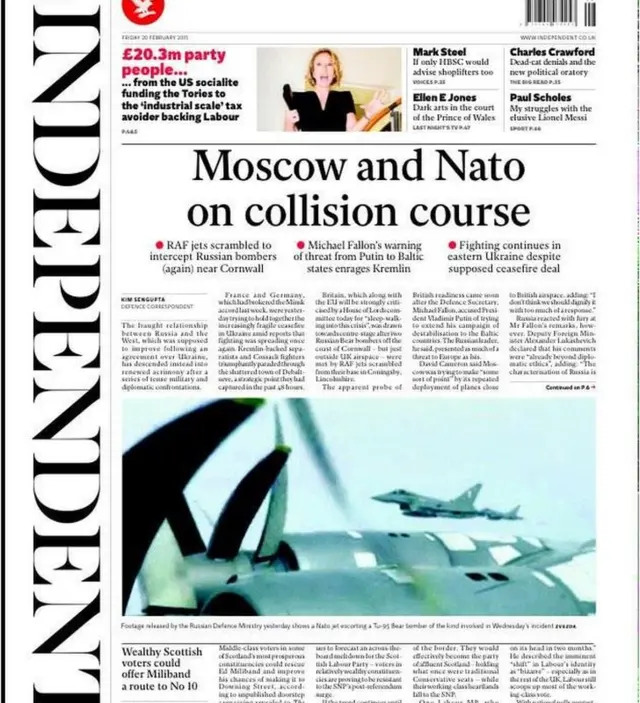
The Independent's lead story is on Russia and Nato tensions - but its front page also features a story about Labour's prospects in Scotland that might prove heartening for Ed Miliband. Unpublished doorstep canvassing suggests middle-class voters are proving resistant to the SNP, it reports, external. You can see a round-up of the rest of today's front pages in our paper review.

The Daily Mail leads on concerns about Britain's ability to counter potential Russian aggression. It highlights comments from Sir Michael Graydon, former head of the RAF, who told the newspaper, external: "I very much doubt whether the UK could sustain a shooting war against Russia. We are at half the capabilities we had previously."
 BBC Radio 4 Today
BBC Radio 4 Today
Attack ads are big in the States - but will they be a big feature of the current election? American strategist Joe Rospars of Blue State Digital, who advised Barack Obama during his 2008 and 2012 campaigns and is now helping Labour, is sceptical. He's told the Today programme the big difference is the amount of money spent in the US, where the expensive strategy of "carpet-bombing people with negative content that isn't very interesting" can pay off. British parties face a "different conundrum of producing negative content that doesn't necessarily go anywhere". In Britain attack ads will have to be popular to make an impact, he suggests.
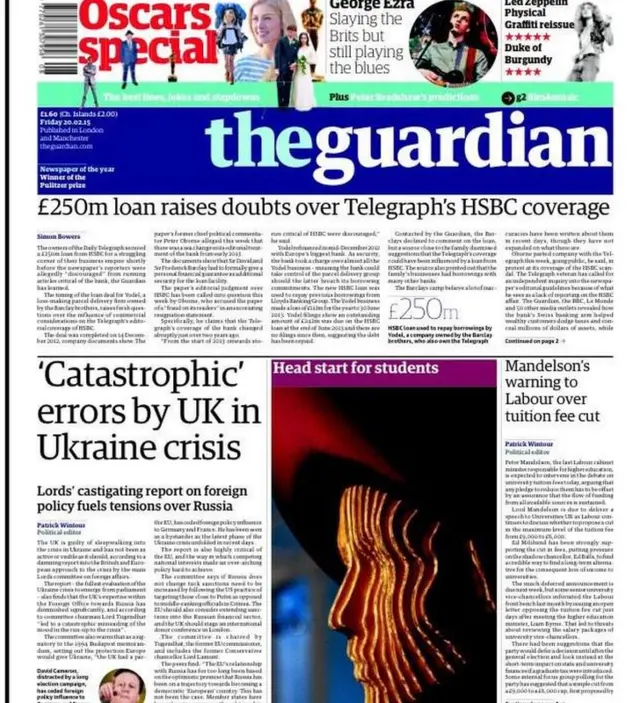
The Guardian splashes on the Lords EU committee's report out today. Its criticisms of the western response to Russia's aggression in Ukraine includes the word "catastrophic", which is just asking to be put in a headline.
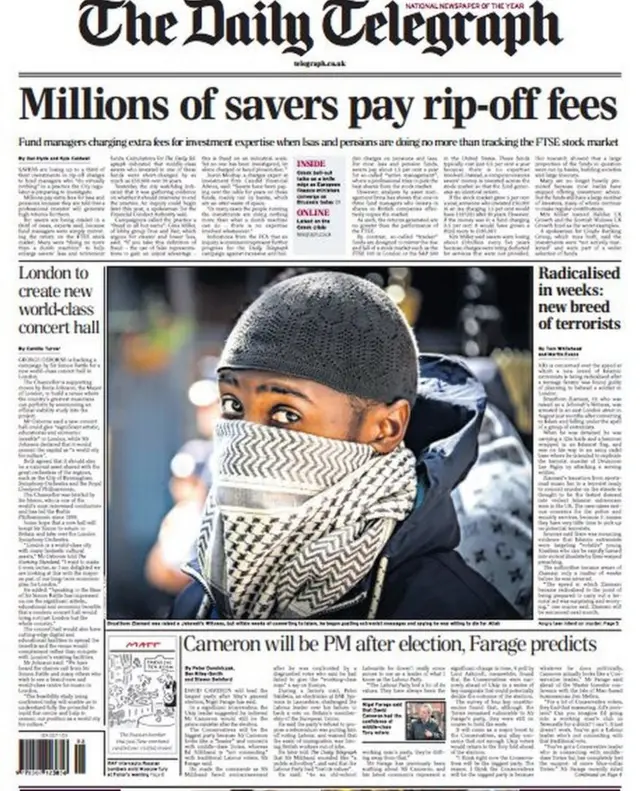 Image source, Telegraph
Image source, TelegraphHere's the first of a few of Friday's papers' front pages. The Telegraph's features a prediction by UKIP leader Nigel Farage that David Cameron will remain in Downing Street after May 7th.
 BBC Radio 4 Today
BBC Radio 4 Today
Part of the pressure on the NHS' A&E departments is the result of delays getting people, often the elderly, out of hospital beds and into care homes or back home. The problem is getting worse, King's Fund chief executive Chris Ham tells the Today programme - there were 23% more beds occupied by people who didn't need to be in hospital in December 2014 than there were 12 months previously. "We need to tackle this problem of delayed transfers. It requires a much more integrated system," Mr Ham says. And what does he mean by 'integrated'? "A single health and social care system - we need to make sure social care is adequately funded and staffed."
 BBC Radio 4 Today
BBC Radio 4 Today
The Today programme continues its tour of 100 seats in 100 days, reaching Wolverhampton South West where Sima Kotecha has been sizing up the student vote. Anger at the coalition's tuition fees reform remains palpable, but former Labour education minister Bill Rammell - who is now the vice-chancellor of the University of Bedfordshire - isn't so sure students only vote on the issues exclusively affecting them. "Students by and large have built it [tuition fees] into their assumptions," he says. You can listen to the report, which airs at 07:30, in full here.
tweets: , externalDress down Osborne - Chancellor on overnight London Underground visit with Boris (who wore a suit)
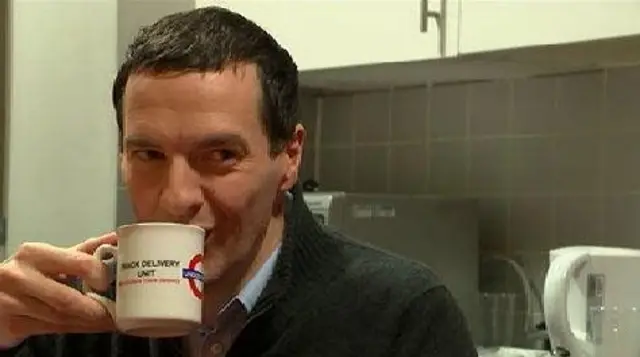
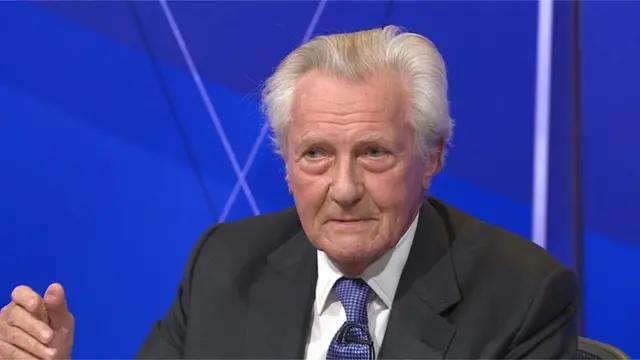
One other big highlight from last night's Question Time was Michael Heseltine's take on Ant and Dec's comments about their disillusionment with Labour, external. Earlier this week Ant said he didn't know what Labour stood for any more and Dec said he couldn't picture Ed Miliband as prime minister. After initially admitting he was not 100% certain who exactly this duo were, Lord Heseltine ventured some advice. "I can help these people, Ant and Dec," he declared. His suggestion was: "Bash the oil companies, renationalise the railways and tax everybody who's got a big house. It's called 50 Shades of Red. A blockbuster by Ed Miliband".
 BBC Radio 4 Today
BBC Radio 4 Today
Who owns the internet? It's a question that's come up again and again over the last year as the EU and US spar over regulation of the big online companies - Google, Facebook and the like. At the weekend, President Obama made his view quite clear - the US owns it, and the EU should back off. It's irked a few on this side of the Atlantic, not least former government online advocate Baroness Martha Lane Fox. She told Today her heart "was broken on so many levels" by President Obama's words. It was "tragic" that he, who should be a "symbol" of the best of the internet, had descended into a "parochial" view and had made a "false statement". She adds that the internet "doesn't work if only one country owns it".
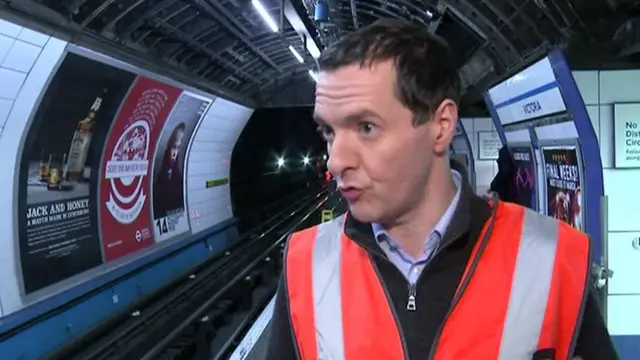
Chancellor George Osborne was asked about Greece while in the bowels of the Underground early this morning. He said: "What you see now in this stand-off between the eurozone and Greece is the risk of a full-blown crisis which would do real damage to the European economy, and it's a risk to Britain. We need the eurozone to find a common solution and here at home we need to go on working through our economic plan that has kept us safe. Now would be a terrible time to see that plan abandoned because it would put our country at risk."